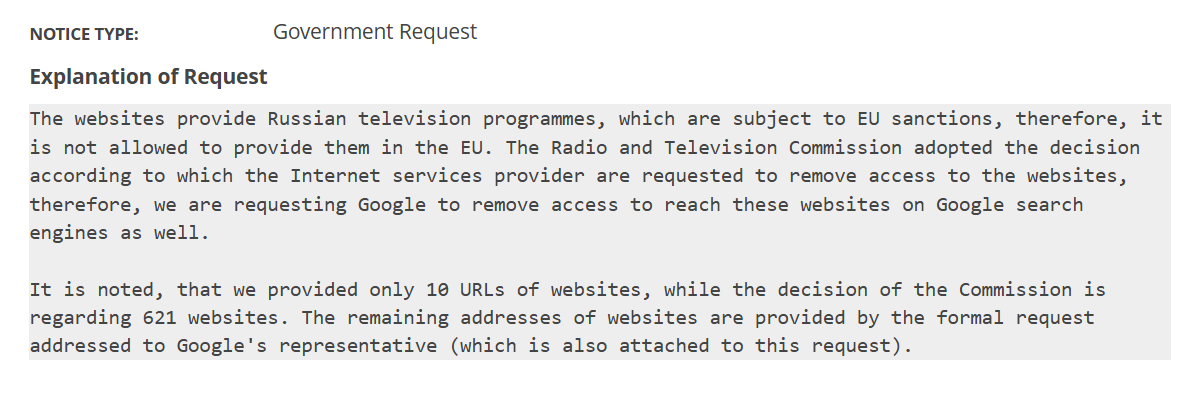-
chevron_right
ISP Huffs and Puffs Then Apologizes to 3 Little Piggies Over Pirate Downloads
news.movim.eu / TorrentFreak • 13 January, 2025 • 4 minutes
 So-called ‘three strikes’ anti-piracy schemes were once considered a cutting-edge response to P2P piracy.
So-called ‘three strikes’ anti-piracy schemes were once considered a cutting-edge response to P2P piracy.
Also known as ‘graduated response’, a typical scenario would see rightsholders monitor BitTorrent swarms to capture participants’ IP addresses sharing their content illegally. Those IP addresses would then be reported to a friendly (or coerced) ISP for matching against subscriber records, as a prelude to ISP customer outreach.
An initial letter sent to a subscriber would typically advise that piracy is illegal, so stop it. A second more strongly-worded letter would follow in case of continued infringement, with a third letter heralding termination of the subscriber’s account.
Eircom (Now Eir) Resisted, Then Got on Board
Following legal action by the Irish Recorded Music Association (IRMA), representing EMI, Sony, Universal and Warner, Irish ISP Eircom reached a settlement with the labels in 2009, leading to the introduction of a similar program, albeit to a background of legal complications.
As the labels attempted to force other ISPs to comply , ‘three strikes’ was taken off the table , then put back on . By then, however, sharing music via BitTorrent had almost completely collapsed, with most pirates preferring YouTube and the free-tier of Spotify.
Piracy at 3 Little Piggies
With the majority of music piracy now taking place on sites ripping music from YouTube, it’s remarkable that a three-strikes scheme dating back 15+ years is still operational at Eir. Proof of that arrives courtesy of Paul Walsh, owner of the 3 Little Piggies cafe on Union Quay in Cork, who recently received a warning letter from Eir confirming his very first ever piracy ‘strike’.
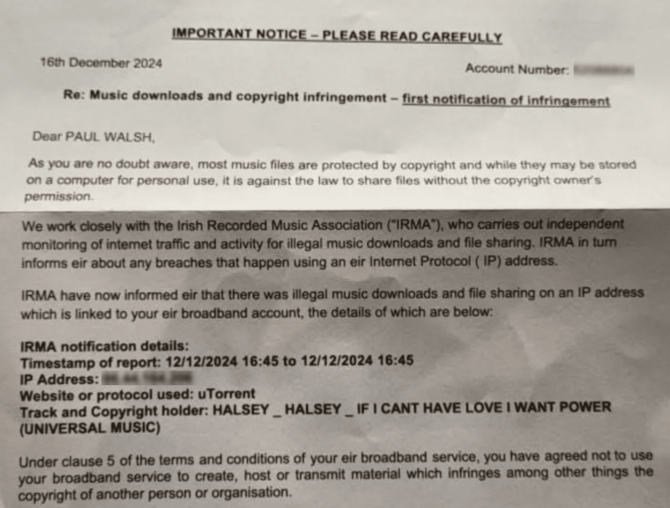
Walsh seemed genuinely surprised by the letter. Speaking with Corkbeo , he said he’d never seen anything like this before.
“I’ve never seen a notification like this. It’s kind of worrying that they’re saying the onus is on you,” Walsh said.
The letter contains a warning about the consequences of future infringement, including termination of Walsh’s internet connection should infringement continue. In common with all similar communications, the person paying the bill faces allegations; in this case, regardless of the fact that Walsh is a business customer of Eir, operating a free Wi-Fi service for the benefit of customers.
“What alarms me about this is that it’s the first time we’ve seen this and they’re saying I’m the one liable. If you want to get more serious, what if someone downloads something they shouldn’t be downloading? That’s opening up a can of worms,” he said.
Eir Apologizes, Warning Letter Sent in Error
Receiving an apology from an ISP is extremely rare in these cases, but Walsh received one nonetheless. In a statement, Eir encouraged all users “to be aware of copyright laws in both residential and business settings” while acknowledging that the ‘three strikes’ program only applies to its residential customers. Those with a business account are exempt, so the warning letter shouldn’t have been sent in the first place.
This effectively removes the ‘strike’ and eliminates the threat of future disconnection. Good news for a business owner and customers alike, even though one of them appears to have triggered this chain of events by downloading and sharing an album. Or did they?
Information and Notification
A document leaked in 2009 claimed to detail the draft protocol for administering the ‘three strikes’ program. One section detailed the minimum information that must appear in a notification for Eir (then Eircom) to consider a notification valid.
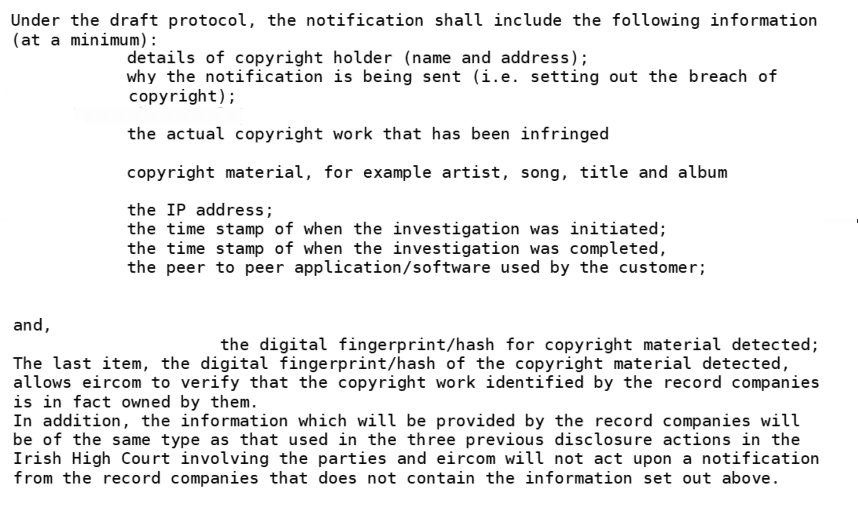
Without losing sight of the age of the scheme, in terms of evidence the minimum requirement detailed above is fundamentally sound. What is evident, however, is that the level of detail in the notice received by Paul Walsh is well below that previously considered the minimum.
Below Minimum Evidence
Despite the major record labels driving this entire program, the requirement to identify the copyright holder making the allegation appears to be missing at the point of delivery. But more interesting than that is the requirement to provide a “time stamp of when the investigation was initiated” and the “time stamp of when the investigation was completed.”
The warning letter clearly states that the ‘investigation’ began at 16:45 on the day in question, and ended at 16:45 on the very same day. That’s not an investigation, it’s a passing glimpse; and indeed, a glimpse of what exactly?
The requirement to provide a hash for the copyright material detected also appears to be absent from subscriber warning letters. Eircom requested these values “to verify that the copyright work identified by the record companies is in fact owned by them.”
For the same reasons, those receiving a warning letter would also find the information useful. For business subscribers exempt from notification it’s mostly irrelevant, but for residential bill payers – who may also share their connections with many other people who pay nothing – liability very often appears to be taken for granted. And without sufficient information to fight back, the chances of winning are extremely slim.
There are claims that mistakes simply aren’t made; 3 Little Piggies receiving this letter in the first place clearly shows otherwise.
From: TF , for the latest news on copyright battles, piracy and more.

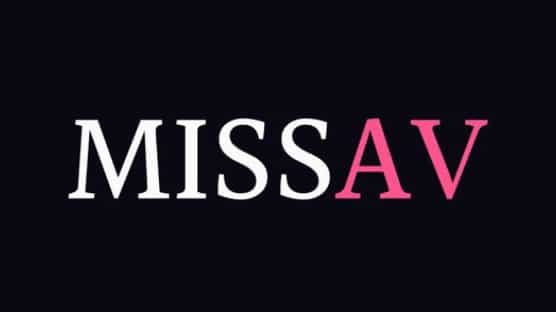 Adult entertainment is massively popular online and there are many pirate sites that specialize in this niche.
Adult entertainment is massively popular online and there are many pirate sites that specialize in this niche.


 Manga and anime have become increasingly popular in recent years. These formats originate in Japan but are now in demand worldwide.
Manga and anime have become increasingly popular in recent years. These formats originate in Japan but are now in demand worldwide.




 With limited choice mostly a thing of the past, domain names today are available in many flavors. Above all others, however, the gTLD
(generic top-level domain)
.com is the most enduring.
With limited choice mostly a thing of the past, domain names today are available in many flavors. Above all others, however, the gTLD
(generic top-level domain)
.com is the most enduring.


 The ease with which IP addresses and BitTorrent downloads can be tracked has created a fertile ground for copyright lawsuits.
The ease with which IP addresses and BitTorrent downloads can be tracked has created a fertile ground for copyright lawsuits.



 After labeling DoodStream the world’s largest illegal video hosting site, the major Hollywood studios, Netflix, Amazon, and Apple,
After labeling DoodStream the world’s largest illegal video hosting site, the major Hollywood studios, Netflix, Amazon, and Apple,
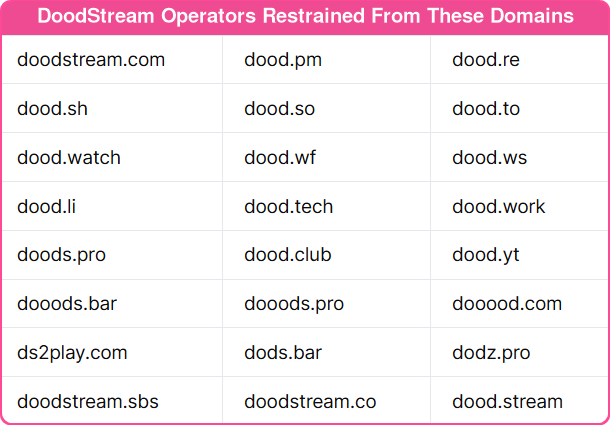

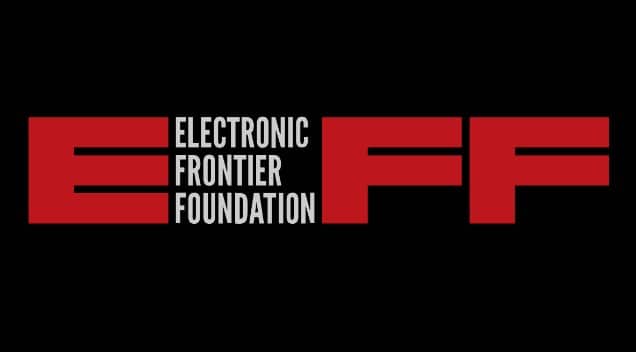 In the early 2000s, the music industry took a stand against online piracy by going after tens of thousands of alleged pirates through U.S. courts.
In the early 2000s, the music industry took a stand against online piracy by going after tens of thousands of alleged pirates through U.S. courts.
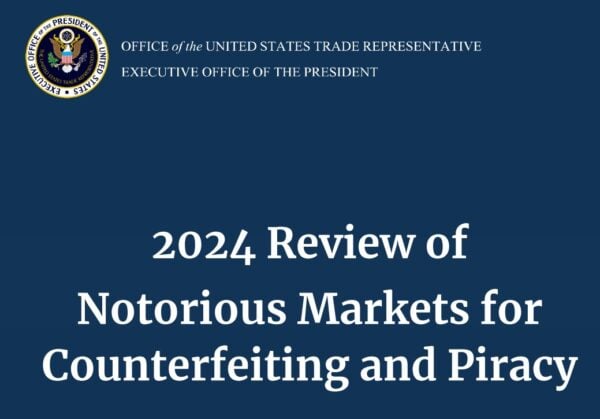 The United States Trade Representative (
The United States Trade Representative (


 The adage that the first casualty of war is the truth held solid as Russia denied any intention of invading Ukraine, even as it was actively doing so.
The adage that the first casualty of war is the truth held solid as Russia denied any intention of invading Ukraine, even as it was actively doing so.
